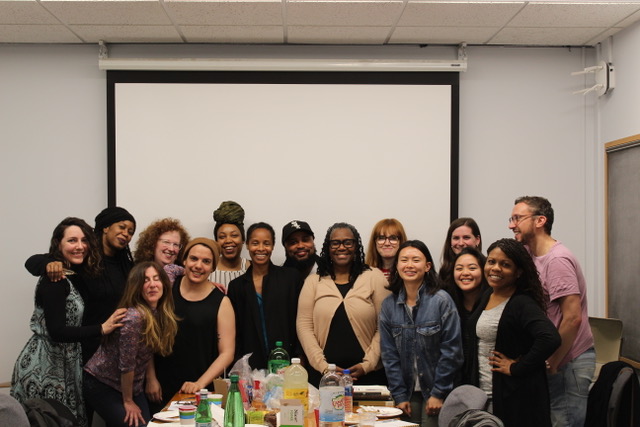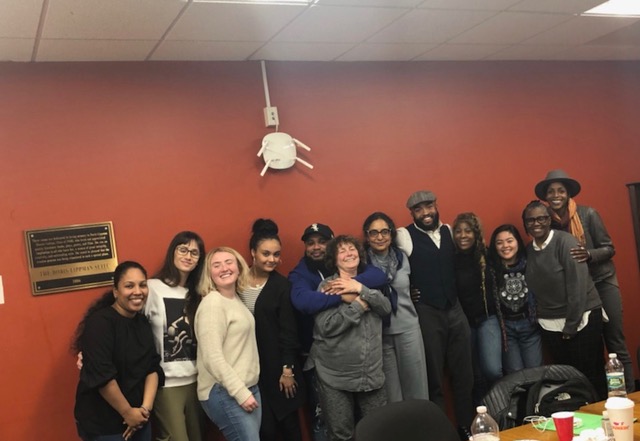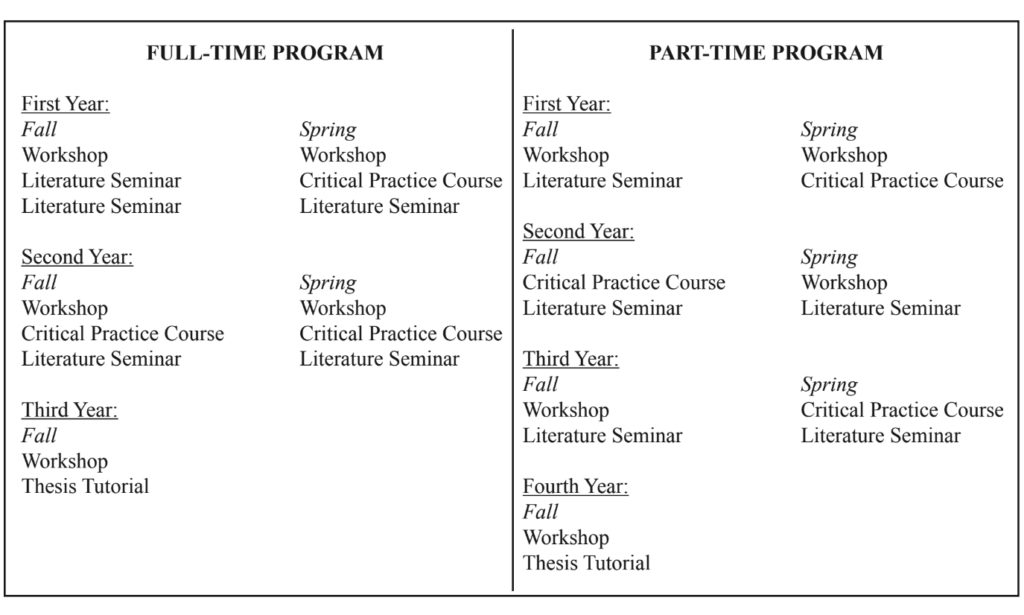CURRENT STUDENTS
Course Info
Follow the link below to see the updated course bulletin.
Requirements
- Five writing workshops (15 credits; students may take fiction, poetry, or non- fiction workshop up to 4 times for credit. The fifth workshop must be in a different genre. (For example, 4 fiction workshops and 1 poetry workshop)
- Five literature seminars (15 credits)
- Three critical practice courses (9 credits)
- One thesis tutorial (3 credits)
Note: There is no foreign language requirement for MFA students who enrolled in Fall 2011 or subsegment semesters. The requirement still applies to students who enrolled before Fall 2011.

Pending Grades (including INC):
No one can graduate with a pending grade on his/her transcript. Make sure that you take care of all of your pending grades and credits from e-permits, study abroad, and incompletes.
Transfer Credits:
No more than six (6) approved graduate credits may be taken outside the Graduate program’s course offerings, and all writing workshops must be taken within the program.
E-permit Credits:
E-permit grades do not appear automatically in CUNYFirst. Once you receive a grade from your host college, please request that the host college transcript be sent to Mitchel Johnson ([email protected]) at the Registrar’s office at CCNY.
MFA Thesis Expectations
The thesis tutorial is an independent tutorial (3 credits) arranged between the student and his or her mentor (first reader) with a goal to produce a manuscript that will be the culmination of that student’s work in the MFA program. It is usually taken during a student’s final semester. The semester before the thesis tutorial, the student should select a mentor; it is important to do this well in advance since creative writing faculty may have other demands on their time. Although every thesis-mentor relationship unfolds in different ways, you can expect in the first meeting to establish a clear timetable for subsequent meetings as well as a timeline to meet college deadlines.
In the meetings with the mentor, you will map out a plan for the thesis, receive feedback, discuss the writing process, and receive guidance and encouragement. You can expect to revise according to this feedback. The number of pages shared with your mentor will vary according to your genre. You will be responsible for copy-editing and checking grammar for the final draft. The thesis will most likely be a collection of creative work you have already assembled over the course of your MFA career that you expand or revise as you work with your mentor. It is not recommended that you begin a new project during the thesis tutorial. Your thesis should be a substantial collection of poems, stories or essays, a portion or draft of a novel, memoir or play. For most students the thesis manuscript is a rough draft of their first book (see minimum page lengths under formatting) rather than something publishable right away. However, you can discuss with your mentor the next steps for your writing career.
Mentor/Faculty Advisor (First Reader)
It is your responsibility to choose a mentor for your thesis. Your thesis mentor should be a member of the creative writing faculty that you have worked with successfully in a workshop. After identifying your ideal mentor, it is appropriate to approach him or her in the semester before your thesis workshop to ask if they will be free to work with you. Your Program Director may be able to suggest Creative Writing faculty members whom the Director feels would be suitable for you if you are unable to cases, MFA students may have their theses advised by Literature professors. the stated requirements, please talk to agreed to serve as your mentor, you may register during registration period for the thesis tutorial.
Second Reader
You must also obtain a second reader for that your second reader be a Literature professor, rather than a creative writing instructor. Your second reader will only is unable to serve as your second reader, a creative writing professor may do so, but will likely be too overcommitted with thesis advisement to read your thesis, and will only be signing off on it.

Applying for Graduation
All students who are eligible to apply for graduation will receive an email to their CCNY email account from the Registrar’s office. This will include a link to Apply for Graduation through CUNYFirst.
Commencement
Students who graduate in the Fall or Winter are invited to participate in the May/June divisional and/or all-school commencement ceremonies.

PROSPECTIVE STUDENTS
Application Deadline for Fall Admission:
February 15
EXTENDED DEADLINE to MARCH 15
Requirements
CCNY MFA in Creative Writing Admission RequirementsTotal Credits: 42
GRE Required: No
Minimum TOEFL/IELTS Scores: 600 (PBT), 100 (IBT) or 7
Degree Awarded: M.F.A
Personal Statement: approx. 500 words addressing the candidate’s relationship to their creative work, literary influences, etc.
Writing sample:Resume/CV
Recommendation Letters: two from appropriate academic or professional references.
Official transcripts: from all post-secondary institutions attended.
For more information on the application process, visit CCNY Graduate Admissions.
For more information on financial aid, visit the Office of Financial Aid.




